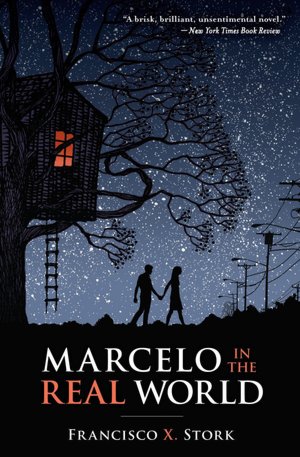Stork, Francisco X. Marcelo in the Real World. New York: Levine/Scholastic, 2009. 314p.
Audience: Upper High School, 15+
Genre: General Fiction
Topics of Focus: Asperger’s Syndrome, Different Abilities, Ethics, Decision-Making, Coming of Age
Marcelo Sandoval enjoys taking care of the Haflinger ponies during the summer before his senior year at the Paterson School, a private institution for special-needs children. He is happy there, does well in his classes, and learns at his own pace. Paterson is safe, familiar, and comfortable. Marcelo is a high-functioning student on the Asperger’s Spectrum.
He hears music in his head, he emotionally distances himself from those closest to him, and he perseverates on issues of religion. His intense fascination with religion is not specific, but rather theoretical. Up to this point in his life, he has been protected enough from making the difficult and moral decisions addressed in religious doctrine. Marcelo’s father, Arturo Sandoval, a successful corporate attorney, doesn’t fully understand the needs of his son and tries to deny the depth of his different abilities. To prepare Marcel for the “real world,” Arturo places him in an entry-level mailroom position at his law firm. Here Marcelo meets and befriends Jasmine. He also is reacquainted with Arturo’s sleazy, cutthroat partner and son, Wendell, both stereotypical, no-ethics, no-compassion, frat-boy-type males. These main players, as well as a small cast of minor ethical personas assist Marcelo in understanding human interaction, competition, and deception. He also begins to understand that while the legal system is a necessary human institution, it is far from perfect in ethical justice. In order to uncover truth and correct past wrongs made by his father, Marcelo must take great risks with his comfort. He must travel unfamiliar physical, intellectual, and emotional paths. He must challenge himself to be vulnerable and to make effective decisions when there is no true answer before him.
He hears music in his head, he emotionally distances himself from those closest to him, and he perseverates on issues of religion. His intense fascination with religion is not specific, but rather theoretical. Up to this point in his life, he has been protected enough from making the difficult and moral decisions addressed in religious doctrine. Marcelo’s father, Arturo Sandoval, a successful corporate attorney, doesn’t fully understand the needs of his son and tries to deny the depth of his different abilities. To prepare Marcel for the “real world,” Arturo places him in an entry-level mailroom position at his law firm. Here Marcelo meets and befriends Jasmine. He also is reacquainted with Arturo’s sleazy, cutthroat partner and son, Wendell, both stereotypical, no-ethics, no-compassion, frat-boy-type males. These main players, as well as a small cast of minor ethical personas assist Marcelo in understanding human interaction, competition, and deception. He also begins to understand that while the legal system is a necessary human institution, it is far from perfect in ethical justice. In order to uncover truth and correct past wrongs made by his father, Marcelo must take great risks with his comfort. He must travel unfamiliar physical, intellectual, and emotional paths. He must challenge himself to be vulnerable and to make effective decisions when there is no true answer before him.
Although the end of the story seems too prolonged and tidy, the story is a solid one. This text will be useful in the classroom to discuss ethical decision-making, different abilities, and resiliency. It is not the type of book that will jump off the shelves into a reluctant or even average reader’s book bag. It will need to be carefully placed into a young reader’s hands with encouragement to pull out the human truths of the story.

No comments:
Post a Comment